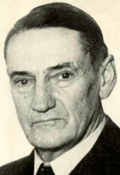 |
Ernest George Jansen
b. 7 Aug 1881, Strathearn, Dundee district, Natal
d. 25 Nov 1959, Pretoria, Union of South Africa |
| Title: |
Governor-General of the Union of South Africa :: Goewerneur-Generaal van die Unie van Suid-Afrika |
| Term: |
1 Jan 1951 - 25 Nov 1959 |
| Chronology: |
23 Oct 1950,
appointed by Commission under the Royal Sign Manual and Signet of the Union of South Africa [1] |
| |
1 Jan 1951, Commission takes effect upon a date prescribed for superseding the Commission of a predecessor (1 Jan 1951) [1] |
| |
1 Jan 1951, made an affirmation of allegiance and an affirmation of office as Governor-General of the Union of South Africa, Government House, Cape Town [2] |
| |
25 Nov 1959, died [3] |
| Biography: |
| Received education at home, later went to school at Ladysmith and matriculated (1898) at the Durban High School, where he was the only Afrikaans-speaking student; articled to a firm of attorneys in Pietermaritzburg (1902); obtained, through correspondence courses, the degrees of bachelor of arts (1901) and bachelor of laws (1905) from the University of the Cape of Good Hope; was admitted as an attorney in 1906 and four years later founded the firm of attorneys, Murray and Jansen; admitted to the Bar in Pietermaritzburg (1913) and set up a practice as a lawyer; entered politics shortly before the creation of the Union of South Africa as secretary of Het Kongres, political organisation of the Afrikaner in Natal; retained this position when it became known as De Volksvereniging; after the integration of De Volksvereniging with the South African Party (SAP), founded in 1911, he was Natal provincial secretary, also serving on the executive committee of the SAP; unsuccessfully contested the seat of Unwoti at the 1915 General Election; was a member of the Independence Deputation (1919), attempting to restore the independence of the Boer republics at negotiations in Paris; after another defeat in 1920, he was finally elected to the House of Assembly on the ticket of National Party (Nasionale Party), representing Vryheid (1921-1943); served as Speaker of the House of Assembly (1924-1929, 1933-1943), being highly regarded for his firm and impartial administration; was appointed minister of native affairs and of irrigation (1929-1933) in the cabinet of James Barry Munnik Hertzog; sided with Hertzog and became a member of the United National South African Party (Verenigde Suid-Afrikaanse Nasionale Party) in 1934; when the United National South African Party split over the war motion in 1939, he withdrew his support of Hertzog and joined the Reunited National Party (Herenigde Nasionale Party, HNP; from 1951 Nasionale Party); after two consecutive defeats in the election to Parliament (1943 and 1947), he was again returned to the House of Assembly in by-election as a representative of Wolmaransstad (1947-1950); was a member of the party commission which elaborated the concept of apartheid and brought it in political circulation, providing the HNP with the policy basis which ensured its electoral victory in 1948; served as minister of native affairs (1948-1950) in the cabinet of Daniel François Malan; appointed Governor-General of the Union of South Africa (1 Jan 1951 - 25 Nov 1959), being the first Nationalist to hold this office. |
| Biographical sources: "Dictionary of South African Biography", ed. by W.J. de Kock, D.W. Krüger (et al.) (Pretoria: Nasional Boekhandel Bpk. for National Council for Social Research, Dept. of Higher Education, 1968-1987), 5 vols; obituary: Rand Daily Mail, 26 Nov 1959, pp. 1, 6. |
| |
| [1] |
Government Gazette, No. 4517, Extra, 1 Jan 1951, p. 2. |
| [2] |
Government Gazette, No. 4517, Extra, 1 Jan 1951, p. (1); Rand Daily Mail, 3 Jan 1951, p. 9. |
| [3] |
Rand Daily Mail, 26 Nov 1959, p. 1. |

